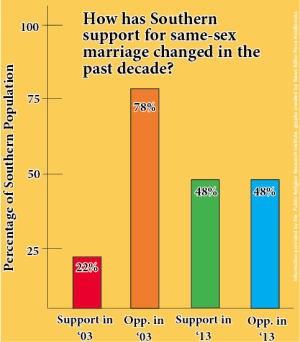Study’s findings suggest rise in Southern support for same-sex marriage
April 17, 2014
A common stereotype in the U.S. is that the country’s political landscape constantly shifts and changes everywhere but in conservative regions like the South. Whether it be because of conservative values or religious leanings — sometimes a combination of both —the southern region of the U.S. has largely been associated with “traditional” values in regards to marriage.
However, the study “A Shifting Landscape: A Decade of Change in American Attitudes about Same-sex Marriage and LGBT Issues” by the Public Religion Research Institute indicates an increase in support for same-sex marriages from Southern Americans.
Although the study does not include a definition of Southern states, a graphic on the PRRI’s website indicates they are following the United States Census Bureau’s definition, which includes: Maryland, Delaware, West Virginia, Virginia, Kentucky, Tennessee, North Carolina, South Carolina, Georgia, Florida, Alabama, Mississippi, Arkansas, Louisiana, Oklahoma and Texas, according to the Bureau’s website.
“PRRI’s mission is to help journalists, opinion leaders, scholars, clergy and the general public better understand debates on public policy issues and the role of religion and values in American public life by conducting high quality public opinion surveys and qualitative research,” the report reads.
This story and its accompanying charts illustrate a small selection from the report that may be relevant to students at UNA, who are considered part of the Millennial generation (which contains anyone ages 18 to 33, according to the report).
“Southerners on the whole are evenly divided on the issue of same-sex marriage (48 percent favor, 48 percent oppose), but there is also a significant generation gap among residents of this region,” the report reads. “Nearly two-thirds (65 percent) of Millennial Southerners favor allowing gay and lesbian people to marry compared to 28 percent of Southerners who are part of the Silent Generation [between the ages of 71 and 88].”
Sophomore Jay Liles believes tensions regarding gay rights in the south may be easing, albeit slowly.
“During my transition from a closeted gay man to an open and proudly gay man, I witnessed not only a pair of people who were raised very fundamentalist (Christian) and also conservative become completely accepting of my sexual orientation, but also an entire community of acceptance open up,” Liles said.
While the survey’s findings are interesting, it is hard to measure changing attitudes, said Tim Collins, professor of political science.
“I think that we are in the midst of societal change where people have come to view things that once would’ve been considered obscene, you see on television on a regular basis,” he said. “Conservatives will often see that as a decline in civilization, while liberals would say it is culture progressing. One thing that is certain is that younger people tend to be moderate and less sure of why they should impose their morality on to other people.”
Richard Allen Stubbs, a sophomore who considers himself an evangelical Christian, tries not to be concerned with the political side of the same-sex marriage debate.
“When it comes to the government and the whole legalize it or not, I try to go back to scripture,” Stubbs said. “In Romans 13 it says to submit to the government. We submit to the government, as long as it’s not keeping the gospel from going forth.”
The far right conservative view is often opposed to the idea of same-sex marriage because of it being viewed as immoral through the lens of traditional Christian values, Collins said.
“At one extreme there would be those who believe in the inerrancy of the bible and that it is to be read and applied literally, and that there are passages in the bible that describe homosexuality as unnatural and against God’s design,” he said. “The reasoning for restricting marriage to be between a man and a woman is to because of that reading of the bible. To religious conservatives, your religious beliefs are not an add-on to your life on the weekend and as a legislator, you would stand by those rules and apply those rules.”
The concern liberals have with traditional Christian values influencing politics is that every citizen in the country does not hold these values, said Robert Koch, director of the University Success Center.
“People use religion to argue against a civil right, but the same time that they’re missing the point and attacking what they are scared of, they are arguing against the separation of church and state,” Koch said. “They are effectively using religion to argue against a civil right and against the constitution. Equality is equality, you’re going to treat every American as equal or you’re going to treat every American as part of a classist society.”
Rep. Patricia Todd (D), the first openly gay public servant in the state of Alabama according to her website, said in an interview that she is surprised that the push for same-sex marriage has come so far in the past decade.
“The past 18 months have seen significant movement on that issue because of the Supreme Court and because of President Obama’s support,” Todd said. “We’ve been struggling with equality issues for decades and the past ten years has seen more and more people come out of the closet. All we want is the same rights and responsibilities as everybody else.”


